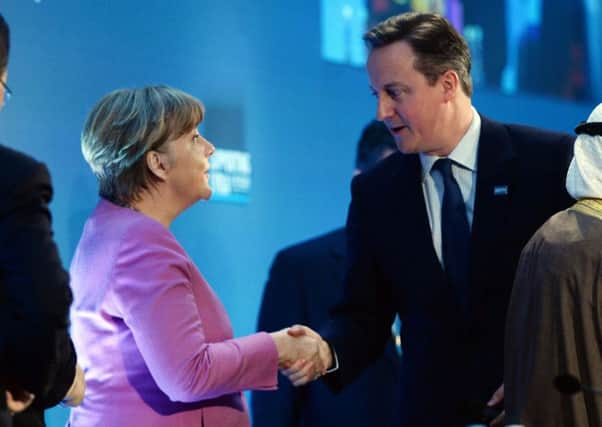World leaders promise £7bn in aid for Syrian refugees


At the end of a conference in London yesterday, Prime Minister David Cameron said the money promised by more than 60 countries would give hope to the millions of people displaced in the five-year civil war.
Mr Cameron said some £4.1bn has been pledged this year and a further £3.4bn will be handed over by 2020. Britain is donating an extra £510 million, taking the total funding from the UK to £2.3bn.
Advertisement
Hide AdAdvertisement
Hide AdCountries neighbouring Syria have also agreed to educate refugee children to ensure there is no “lost generation”, Mr Cameron said.
But there was a stark warning by Turkish prime minister Ahmet Davutoglu of a fresh “humanitarian disaster” after regime forces – supported by Russian airstrikes – cut off the northern city of Aleppo.
Mr Davutoglu said that a supply corridor between the city and the Turkish border had been overrun, and accused Assad of preparing to mount a “siege of starvation” against Aleppo’s 300,000 inhabitants.
Ten thousand people had already fled to the border at Kilis in the hope of finding a “safe haven”, he said, while another 30,000 had “escaped” from refugee camps in the area and were heading in the same direction.
The offensive against Aleppo has already halted the latest attempt to re-start international peace talks in Geneva after just two days.
Mr Davutoglu bitterly denounced the involvement of Russian warplanes, saying that in the past three days they had mounted 351 airstrikes against the rebels – including civilian targets – and none against Islamic State.
Mr Cameron urged Russia to use its influence with the Assad regime to end the “indiscriminate” attacks, particularly the use of barrel bombs against civilian targets.
“We must urgently redouble our efforts to prevent the intolerable levels of violence against civilians, ensuring all parties in the conflict bring an immediate end to the ongoing violations of international humanitarian law,” he said.
Advertisement
Hide AdAdvertisement
Hide Ad“Russia should support steps towards a ceasefire as envisaged by the Vienna process and mandated by the UN Security Council.”
United Nations secretary general Ban Ki-moon said it was deeply disturbing that his special envoy Staffan de Mistura had been forced to “pause” the Geneva talks so soon after they had started.
US secretary of state John Kerry said that he had had a “robust” discussion with his Russian counterpart Sergey Lavrov and called on Moscow to abide by a UN Security Council resolution requiring immediate access for humanitarian agencies and an end to attacks on civilians.
“It is an obligation accepted by all parties in the United Nations resolution. Russia voted for that, Russia has responsibility – as do all parties – to live up to it,” he said.
Mr Ban hailed the international conference in London as “a great success”, saying: “Never has the international community raised so much money on a single day for a single crisis.”
Scotland’s minister for Europe and international development Humza Yousaf said: “We welcome the announcement by the UK government and others of increased funding to support those who have been forced from their homes by violence and persecution. Supporting humanitarian aid and economic development in the region is essential, but we encourage the UK government to do more.”